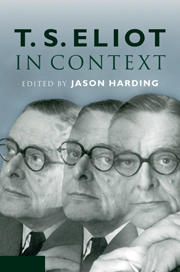Book contents
- Frontmatter
- Contents
- List of illustrations
- List of contributors
- Acknowledgements
- List of abbreviations
- Introduction
- PART ONE LIFE
- PART TWO FORMS
- PART THREE LITERARY CROSS-CURRENTS
- PART FOUR POLITICS, SOCIETY AND CULTURE
- 26 Politics
- 27 Economics
- 28 Anti-Semitism
- 29 Gender
- 30 Religion
- 31 Philosophy
- 32 Social science
- 33 Natural science
- PART FIVE RECEPTION
- Further reading
- Index
26 - Politics
Published online by Cambridge University Press: 05 August 2012
- Frontmatter
- Contents
- List of illustrations
- List of contributors
- Acknowledgements
- List of abbreviations
- Introduction
- PART ONE LIFE
- PART TWO FORMS
- PART THREE LITERARY CROSS-CURRENTS
- PART FOUR POLITICS, SOCIETY AND CULTURE
- 26 Politics
- 27 Economics
- 28 Anti-Semitism
- 29 Gender
- 30 Religion
- 31 Philosophy
- 32 Social science
- 33 Natural science
- PART FIVE RECEPTION
- Further reading
- Index
Summary
The more the gap widens between Eliot's time and our own, the more abrasively his socio-political pronouncements and ideological affinities rub against his name. His exclusionary sympathies (with authority, elitism, Anglo-Catholicism and royalism, for instance) hardly lie flush with our predominantly secular, egalitarian and multicultural values, while, as Roger Kojecký noted as long ago as 1971, ‘the number of those who have been shocked or repelled by his irreverent attitude towards ideals such as liberalism and democracy is greater than the number who have set themselves to discover what, positively, Eliot did believe.’ Kojecký added: ‘Frequently only two or three phrases … have sufficed to convince that his views on social matters were thoroughly reactionary, or highly eccentric, or both’. Most damagingly of all, Eliot has been branded an anti-Semite, a fascist and eugenicist, all notably serious charges in the aftermath of the Second World War, and although it has also been recognised that each accusation demands more nuanced calibration, if not qualified rejection, Eliot's politics were too tightly bound up with the charged polarities and post-Darwinian bugbears of his epoch ever to be wholly free of censure. Ultimately, however, if his political opinions and alignments are to be deplored for their obnoxiousness and excoriated for their occasional extremity, then they also need to be understood as coterminous with his profound sense of cultural exclusion. Eliot's values and those of his age rarely overlapped and were mostly at loggerheads.
- Type
- Chapter
- Information
- T. S. Eliot in Context , pp. 265 - 274Publisher: Cambridge University PressPrint publication year: 2011
- 1
- Cited by



